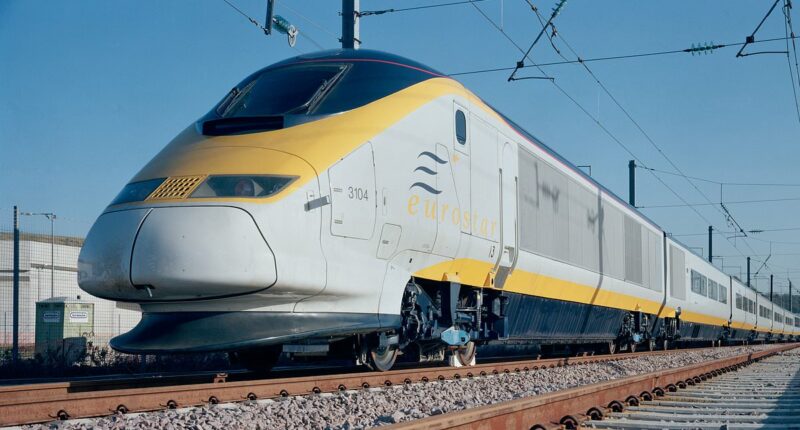Share this @internewscast.com
The operator of the Channel Tunnel, Eurotunnel, has decided to halt future investments in the UK, a move that has sparked concerns over Labour’s impact on the business climate. This decision is tied to a significant increase in its tax obligations, which has raised fears that the current political climate may be pushing enterprises away.
Eurotunnel announced the cancellation of its investment plans after discovering that its annual business rates will rise dramatically from £22 million this year to £65 million by 2028. This substantial increase has led the company to reconsider its financial commitments in the UK.
Amidst this development, uncertainty looms over potential tax hikes in the upcoming Budget, which is weighing heavily on both consumer and business confidence. Recent data revealed a sharp decline in factory output, the steepest since the pandemic, while a new report indicates that households are preparing for possible financial challenges ahead due to upcoming fiscal policies from the Chancellor.
As this situation unfolds, UK borrowing costs have surged, reflecting investor concerns over the possibility of the government engaging in a significant £300 billion borrowing spree. Such financial maneuvers contribute to the apprehension surrounding the country’s economic future.
Eurotunnel’s strategic withdrawal has fueled criticism that Labour might be rendering the UK an unattractive destination for investment. This follows similar announcements from major companies like ExxonMobil, AstraZeneca, and Merck, which have also opted to retract their investment intentions within the UK.
Eurotunnel’s decision prompted accusations that Labour was making Britain uninvestible. It comes after other companies including ExxonMobil, AstraZeneca and Merck also said they were cancelling investments in the UK.
And Gatwick Airport recently warned that its future investments, including its second runway, could be put at risk by a possible 300 per cent increase in its business rates bill.
Tory business spokesman Andrew Griffith said: ‘Rachel Reeves needs to stop milking businesses to the point no one is investing and the country doesn’t get the infrastructure we need.’

The operator of the Channel Tunnel has cancelled future investments in the UK thanks to its soaring tax bill (File image of a Eurostar train)
Eurotunnel boss Yann Leriche told the Financial Times that the expected increase in business rates ‘makes all of our investments lossmaking, so we won’t be making any more investments’.
He added: ‘As of today, we have frozen our investment in rail assets in the UK.’
It means the company will no longer go ahead with plans to reopen a freight terminal in Barking and to run a new direct freight service from Lille, projects that would have cost a combined £15 million.
Mr Leriche also warned that ‘tens of millions’ in higher costs would be passed on to operator Eurostar, resulting in higher fares for passengers travelling across the Channel to Paris or Brussels and delays to plan to open new routes.
Eurostar said: ‘A three-fold increase in business rates for Channel Tunnel users for the second time would be at odds with the government’s ambition of economic growth, pioneering European rail connectivity, and encouraging low-carbon rail travel’.
Elsewhere, figures from the Confederation of British Industry (CBI) showed a sharp fall in manufacturing output in the three months to November – the steepest since August 2020.
CBI lead economist Ben Jones said**:** ‘What’s striking in this month’s survey is how consistently firms link the slowdown to uncertainty ahead of the Budget, with customers delaying purchases and investment until they know what’s coming.’
Meanwhile closely-watched figures from market research firm GfK showed a ‘bleak’ dip in consumer confidence this month as next week’s Budget approaches.

Eurotunnel’s decision prompted accusations that Labour was making Britain uninvestible (File image of St. Pancras Station)
Neil Bellamy, consumer insights director at GfK, said: ‘The public is bracing for difficult news, with little in the current climate to lift expectations.’
The findings included a ‘troubling’ dip in intentions to make major purchases such as fridges or sofas, suggesting households are ‘tightening their grip’ just as retailers move into the crucial festive trading period.
Separately, a survey from the Institute of Chartered Accountants in England and Wales found 81 per cent of firms believe Rachel Reeves must signal a ‘clear change of course’ in the Budget – including no more tax for business and reforms to VAT and business rates.
‘The UK stands on a precipice – small tweaks and timid measures will not unlock UK growth. Businesses need certainty from Government,’ said ICAEW chief executive Alan Vallance.
In the bond markets, there have been signs in recent days of investors increasingly losing patience with the government.
Yields on ten-year UK bonds, known as gilts, spiked above 4.6 per cent yesterday to a four-week high before slipping back.
It came as a poll by Bloomberg revealed investors expect the government to issue £9 billion more in gilts in the current financial year than previously planned, taking the total debt sold to financial markets to £308 billion – the highest level since the pandemic.
That followed jitters over the government’s U-turn recently on income tax – which it is now briefing will not go up as previously thought, leaving investors to wonder where Ms Reeves will find the money to fill her financial black hole.
Analysts at Pantheon Macroeconomics said: ‘The Government’s U-turn on hiking income tax shows that the political situation is deteriorating. Risks to yields are upward as a potential Labour Party leadership challenge increases the pressure to spend.’
















